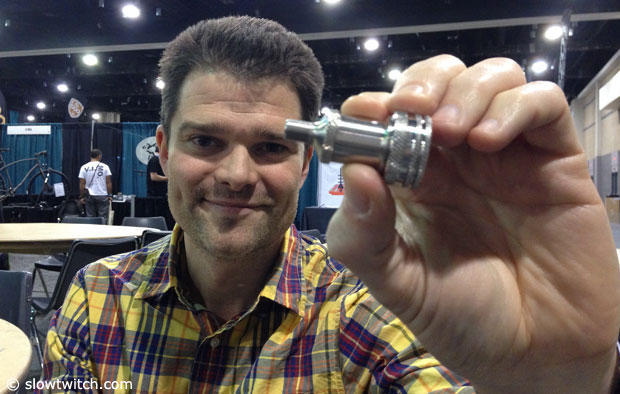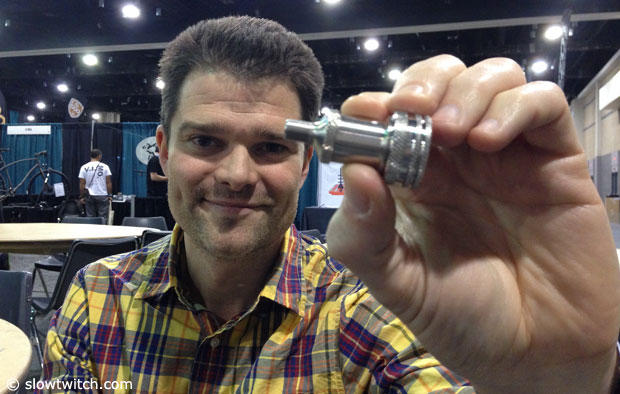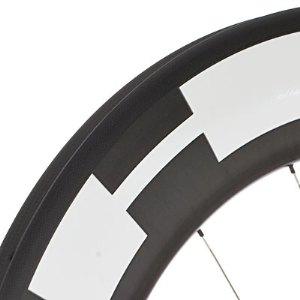Thoughts on science & perception
During a recent forum discussion about bike sizes, stem length and test rides, Josh Poertner of Silca added a few thoughts on science and perception based on his experience while working for Zipp Speed.
In the thread a forum member had asked for bike size advice and another poster made comments about a 110 stem being not very long – and Josh Poertner then obliged with the following detailed response.
"I don't know anything about your fit other than the 110 stem (which Aaron is right, 110 would have meant that frame was way too big for you 20 years ago as we all had 120-130s), but from experience I might guess that part of the liveliness you feel in that bike is because of it's relatively small size compared to the others you're riding. A more compact frame can have different stiffness/damping characteristics that make it feel 'livelier' than a larger one, but even moreso, I'm a strong believer in the mental aspect of the small bike. My personal opinion is that your brain likes the look of a smaller bike under you, makes you feel big and strong. When i was racing in Europe many years ago, it was common for riders to talk about good days and bad days in terms like 'I had long legs today' or 'felt like I could crush my bicycle beneath me' while bad days were days where 'I couldn't get on top of my bike today', 'too much bike under me', 'short legs today' etc.. Combine that with the improved straight line stability you feel with a longer stem (it takes larger inputs to achieve similar steering angles) and your brain is happy.

I've participated in numerous blind product studies over the years where we controlled bikes or the wheels (I've done this twice with a bike manufacturer during development work around a pro team, and many times with wheels) with fabric shield tensioned between seat post and stem, flat black rattle can paint on everything, etc. In each of these studies, the entire subject group including pro riders, engineers, and other industry people with LOTS of experience, struggled to find any real differences between any of the bikes, until after the study was de-blinded and everybody (including me) instantly began to try and rationalize it all… This is just human nature, we all do it, and from experience, it is nearly impossible NOT to do it.
One of the major discoveries was that after controlling for seat post (round post shimmed into aero frame so as to not give it away) not a single rider found the aero road bike to be less comfortable, less compliant, etc, than the identically setup 'endurance' or 'roubaix' bike (clearly this leaves room for the aero seat post to be why people feel aero bikes are less compliant..seatposts generally have more effect on bike compliance in the lab than frames do, but that's another story). We ran blind wheel tests a couple of times a year at Zipp to benchmark competitive wheels and our own prototypes, and we also found that blinded riders were generally unable to tell the difference between stiffness and inertia, had no reliable feedback on weight, lateral stiffness, or comfort in general, and in the end were generally only able to pick out the aero wheels because they were riding laps around a closed park environment using power, so the more observant ones would notice speed differences. In the end, we sort of determined that when riders didn't know what they 'should' feel, they really struggled to find differences in stiffness, compliance and weight between frames or wheels. The strongest correlation we ever saw was to tire pressure, but not in the way you would expect. Almost everybody assumed the setups with lower tire pressure to be the endurance bike and would then score it exactly as you would expect a magazine review of a comfort bike to look…so we determined that we all naturally would latch onto something we were confident in, in this case comfort, and then would proceed to perceive everything you expected from that bike: less aero, less stiff, better damping, etc. Imagine the shock for the group when it turned out that the it might have been a super stiff race bike, or an aero road bike! Let the rationalizing begin!
During the 303 Roubaix development, we broke the entire bicycle system into component stiffnesses to try and determine the relative contributions of things to ride quality. We were shocked to find that the entire difference between the special, longer wheelbase, layup optimized, cobble specific frame, and the standard road frame (which everybody could tell you was WAY too stiff to ride on the cobbles) equated to a whopping 4psi of tire pressure. Similar result with wheels, turns out that the 32 spoke box section Amrosio rims the teams swore by had about 50% higher vertical stiffness than the 303…yet the riders swore up and down that the 303 was 'too stiff' until we blinded them, at which point the opinions became nearly random with a slight bias toward the carbon wheel as more comfortable, yet with the riders preferring the carbon wheel only willing to proclaim it because they are all certain that it was the aluminum one.
I'm working on a blog post for the SILCA website related to the story behind the first carbon wheels at Roubaix, I think people will find the journey and many of the results as fascinating as I did. In the mean time, if I were you I'd try riding as many bikes as you can get on and go with what feels right to you and under you. The ONLY factor that I've ever seen be actually influential across all test groups in all studies is aero, so if you're after speed, pay attention to it. Again, not that everybody can feel it in these studies, often times it isn't noticed at all, but it is always apparent in the data. When you put the power/speed data plots in front of the engineers, they have no idea or way to determineIf weight, inertia, compliance, stiffness, but they can instantly pick out the plots with aero wheels or frames. If you're not all about going fast then go with what you like and think works and enjoy yourself. After doing this for a long time, my criteria for my personal bike is based almost entirely on paint and people behind the company who made it, everything else is components and tire pressure."
Josh Poertner posts in the slowtwitch forum under the name joshatsilca and his site is silca.cc






Start the discussion at forum.slowtwitch.com